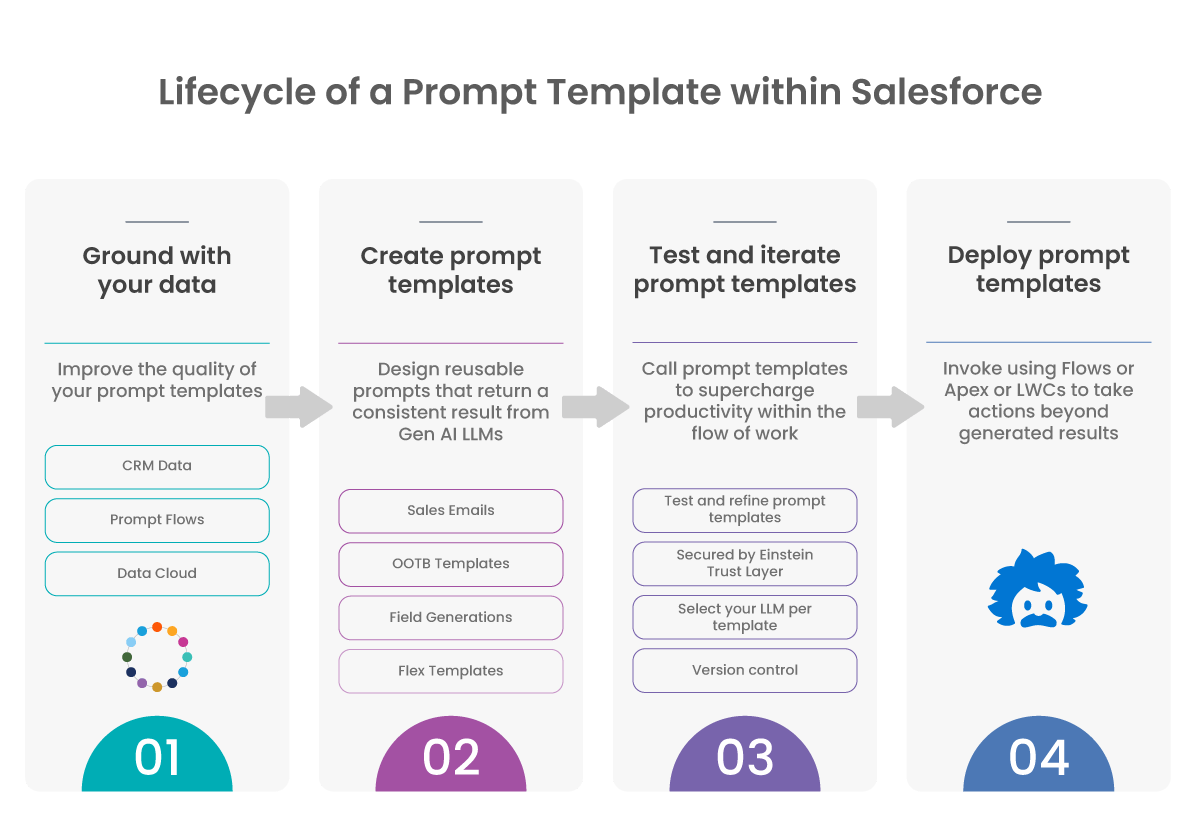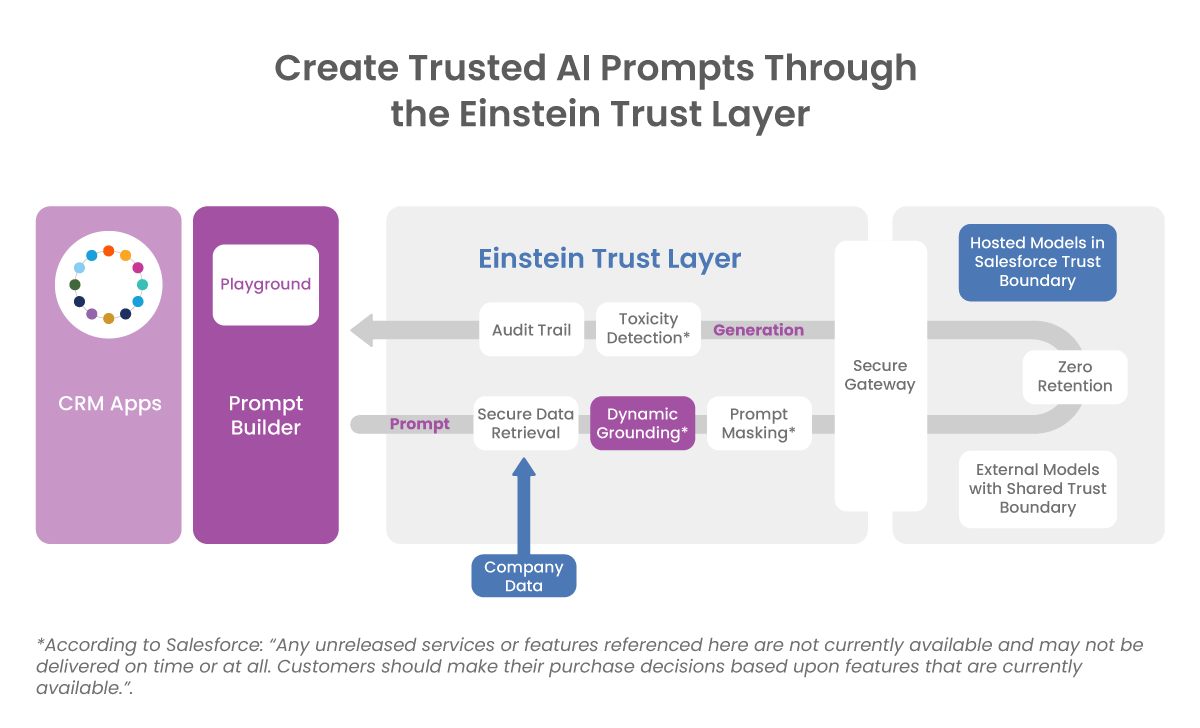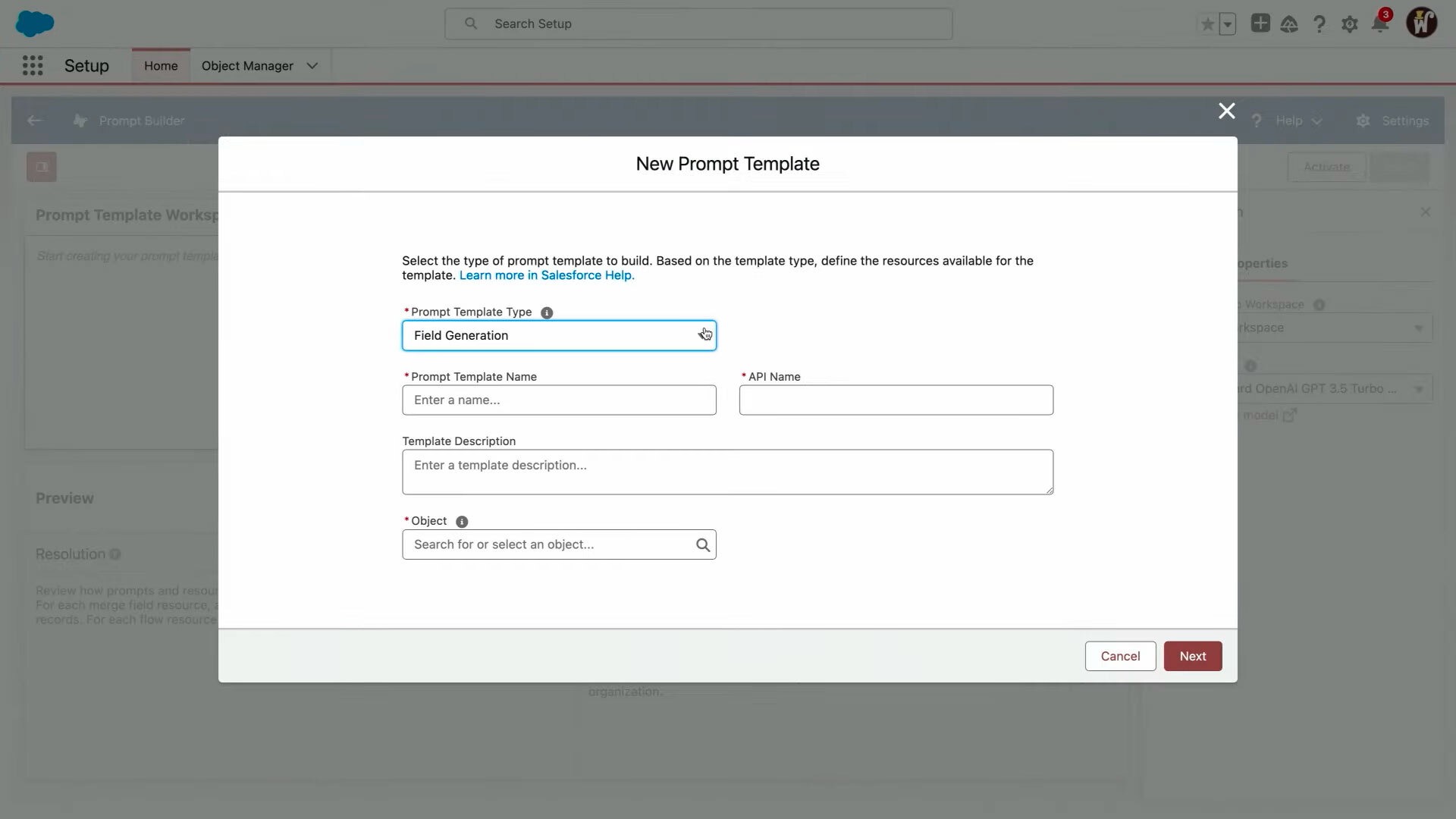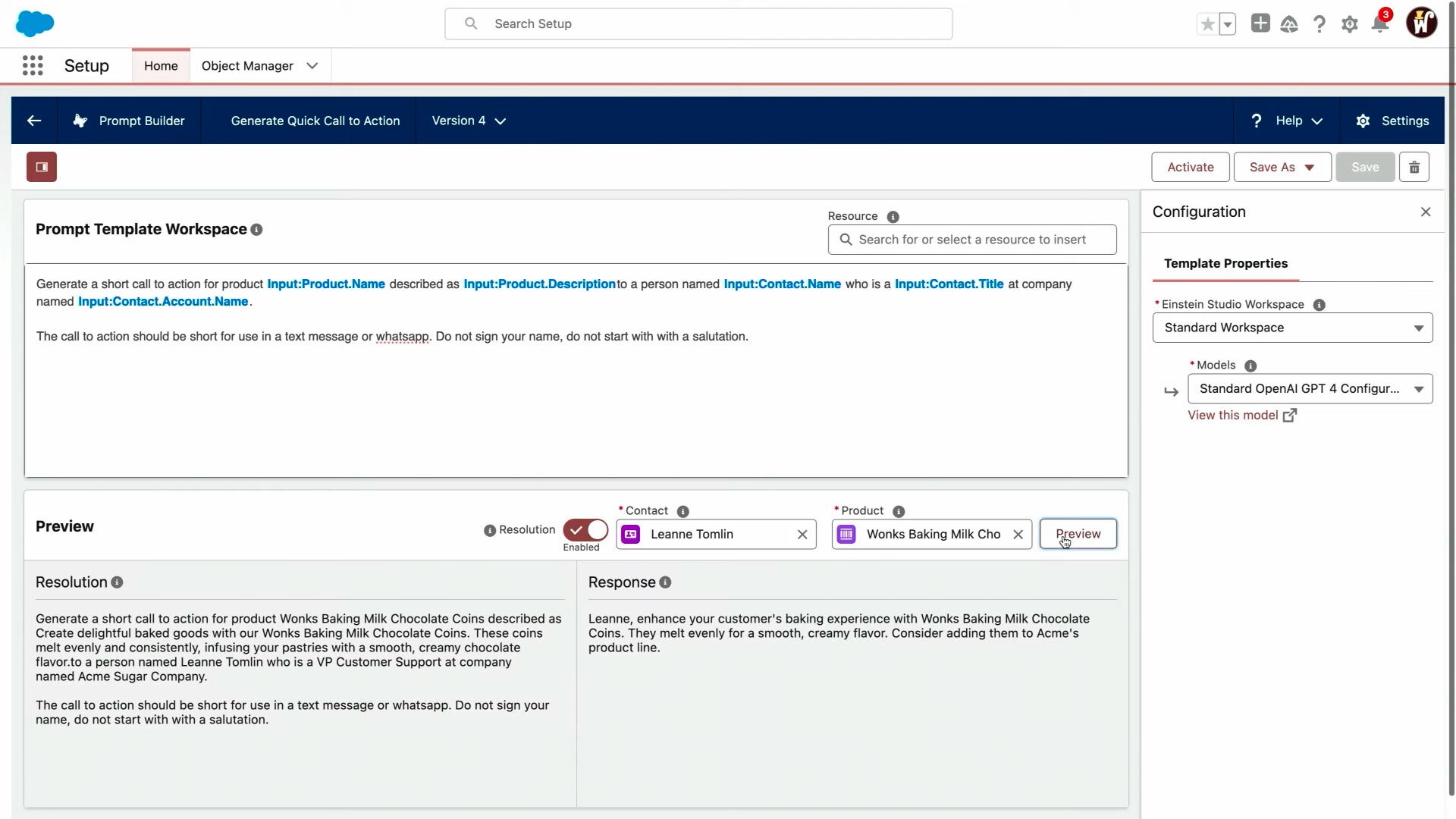Last February, we witnessed the launch of the innovative Prompt Builder, a cutting-edge tool within generative AI. Broadly speaking, this tool establishes seamless mediation between your prompts and the CRM’s AI, generating grounded prompts through data-based descriptions. In other words, it enables Salesforce administrators to create not only single prompts but reusable prompt templates using natural language. For example, prompt templates for sales emails or field generation prompts. Thus, it aims to streamline workflows in any organization, providing reliable AI experiences and prompts guaranteed by the Einstein Trust Layer. This is just a quick glimpse into the Prompt Builder; let’s delve into how powerful it can be.
What is the Prompt Builder?
The Prompt Builder is a specialized tool that facilitates effective communication with a Large Language Model (LLM) by creating specific and contextualized prompts.
In the context of generative AI, prompts are essential for effective communication and obtaining relevant results. Designing prompts involves creating, refining, and iterating on these prompts until precise and high-quality results are achieved. Therefore, vague or confusing prompts can generate irrelevant or biased responses.
To enhance the effectiveness of AI, it is crucial to ground prompts to reality by providing specific data to the LLM that complements its original training. This ensures personalized and relevant responses regarding organizations, products, and customers, thus avoiding generic or irrelevant content. With Salesforce’s Prompt Builder, you can create, test, review, customize, and manage prompt templates that leverage your CRM data. In turn, these templates simplify users’ daily workflows and make your organization smarter. Additionally, it ensures user data protection and the creation of trustworthy messages.
How does it work?
Before delving into how the Prompt Builder works, it’s essential to familiarize yourself with several key concepts:
- Prompt: Detailed instructions for an LLM, optimizing results based on context, specific data, clear instructions, and constraints.
- Response: Result generated by an LLM in response to a prompt; the more detailed the context and background, the better the result.
- Grounding: Providing specific knowledge and context to the LLM, such as CRM data, to avoid generic responses.
- Hallucination: Plausible but inaccurate response from the LLM, often occurring when it lacks access to factual or real-time data.
- Toxicity: Rating responses for rude or disrespectful content, providing security in response generation.
- Prompt Engineering: The art of skillfully constructing prompts to obtain optimal responses from an LLM. With this tool, your administrators can be prompt engineers without having to use code, just clicks and minimal instructions for AI.
With this in mind, let’s discuss the process. The Prompt Builder operates as a powerful yet straightforward tool within the Einstein 1 platform. Its functionality lies in combining prompts for artificial intelligence (AI) with specific data through an intuitive resource selector.
This process employs reusable prompt templates, which act as structured frameworks incorporating placeholders for particular details, such as customer information. By merging these placeholders with real and relevant data through grounding, the prompt template becomes fully personalized. The resulting prompt is then sent to an LLM, allowing for contextualized and accurate responses. This simplified yet efficient approach streamlines the creation of personalized prompts, securely connecting AI prompts with business data.
Salesforce identifies this process as occurring in 4 key moments:

Ground with your data
Grounding allows administrators to dynamically connect prompt templates with Salesforce or Data Cloud data. This connection enables the LLM to understand the context, generating personalized responses without accessing confidential data. Methods for this connection include:
- Merged Fields: Connect templates with object fields in Salesforce.
- Flows: Allow access to related data, such as cases or opportunities.
- Apex: Utilize SOQL or API to retrieve real-time data from Salesforce or other sources.
It is worth noting that confidential information remains secure within Salesforce, without being transmitted to the LLM. This is ensured through the Einstein Trust Layer’s zero-retention agreement.

Create prompt templates
Once these foundations are established, administrators can use the Prompt Builder to create three different types of message templates:
- Prompt templates for sales emails: These templates facilitate the creation of personalized emails with just one click.
- Prompt templates for field generation: These templates allow users to fill in a field with a summary created by the LLM.
- Flexible templates: The templates enable the creation of customized prompts that simultaneously incorporate records from multiple objects.
Regardless of the template type, administrators can add grounding to their prompts through the dropdown resource menu in the workspace. After building the template, it is activated for use.

Test and iterate prompt templates
The tool also facilitates the continuous testing and refinement of templates. Administrators can preview responses based on real data. Additionally, they can evaluate various aspects such as goal fulfillment, style and tone, toxicity, relevance, coherence, bias, and factual accuracy. This iterative adjustment process ensures accurate responses aligned with desired objectives.
It is worth noting that Salesforce is considered agnostic regarding LLMs. In fact, it offers a wide range of LLMs available from the outset to choose the most suitable one according to your prompts. Alternatively, you can also bring your own LLM (BYOM) to further contextualize the prompts with data and processes specific to your organization.

Deploy prompt templates
Regarding the implementation of prompts, administrators have full control over which users can leverage these customized tools. The activation of templates varies depending on their type: sales email templates are implemented on record pages. Additionally, field generation templates are integrated with dynamic forms. Lastly, flexible templates are invoked through various Salesforce platform tools such as flows, Apex, or Lightning web components. Anywhere you can perform an invocable action, you can use a flexible template. This approach allows for adapting the deployment of prompts according to the specific needs of your organization and usage context.
Benefits of the Prompt Builder for Your Organization
As you can see, the Prompt Builder is a simple yet powerful tool. Some of its key benefits include:
- Workflow Optimization: Improves efficiency by streamlining workflows through grounding and automated generation of personalized responses.
- Maximize AI Utilization: Allows you to harness the full potential of generative AI in Salesforce by generating suitable prompts for it.
- Increased Productivity: Streamlines content and response generation, increasing productivity by reducing time spent on manual tasks.
- Adaptation to Specific Contexts: Provides flexibility to adapt implementation according to specific usage contexts, customizing the user experience based on each organization’s needs.
- Message Consistency: Eliminates the need for users to write prompts, ensuring communication coherence through templates.
- Response Evaluation: Facilitates the evaluation of generated responses.
- Agile Iteration: Enables an iterative and agile approach to template refinement, adjusting prompts to obtain more accurate responses.
- Data Security: Ensures security by keeping confidential data within Salesforce, without transmitting it to the LLM model, ensuring zero data retention.
In summary, the Prompt Builder is presented as a revolutionary tool that, once discovered, becomes indispensable. It is transforming the way organizations utilize generative AI, unleashing its full potential and optimizing investment. If you’re looking to implement it in your company, SkyPlanner offers the optimal solution. As a certified Salesforce consultant, we have the necessary experience to accompany and advise you at every stage of the process. Don’t hesitate to contact us! Write to us at hello@theskyplanner.com.



